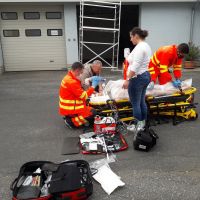Conference on the Treaty of Trianon at the French Institute of Budapest
Knowledge sharing | 29 October 2021
Knowledge sharing | 29 October 2021
On the 27 October French, Hungarian, Romanian and Slovakian experts convened in Budapest in the building of the French Institute at the invitation of Her Excellency, Ms Pascale Andréani French Ambassador to Hungary. The topic was very delicate, namely the Treaty of Trianon which produced those contested borders which still today serve as the basis for interethnic tensions in Central Europe. Alexander Duleba, professor of the University of Prešov also highlighted that in Slovakia, the treaty is not a popular topic.
The speakers of the seminar approached the issue from diverse perspectives. Alain Delcamp, former expert of the Council of Europe concentrated on the inevitability of the existence of the borders which ensure the creation of self-identity. The challenge is, how can we find the ways towards each other across these borders. Gyula Ocskay, secretary general of CESCI selected a very similar approach when highlighting the dialectic nature of cross-border cooperation which, in parallel, protects and overcome the borders.
Ludovic Mendes, the member of the French Parliament applied a rather pro-integration approach focusing on the role that the European Union and the Schengen Agreement play in the international reconciliation. Similarly, Adrian-Gabriel Corpădean, dean of the University Babeş-Bolyai (Romania) stressed the significance of the EU funds (especially the Interreg programmes) which facilitate the development of cross-border cooperation and a multicultural environment.
Alexander Duleba, and José Osete, director of IFECO focused on the importance of the regional initiatives. Professor Duleba analysed the frames of the paradiplomatic activities of the regional actors in the Visegrad countries as the engines of CBC. José Osete presented the Oradea process, a joint initiative of the CESCI, the Metropolitan Zone of Oradea and the IFECO involving local and regional actors in the development of a more favourable climate for cooperation across the Hungary-Romania border.
The above aspects have been summarised by Jean Peyrony, general director of the MOT when analysing the multi-level governance model of the European Union including the community, national and the local/regional level in cooperation.
Péter Bencsik, assistant professor of the University of Szeged coloured the program with detailed explanation of the border and visa regimes of Central Europe before and after the First World War. These periods of time were characterised by a gradual territorialisation where the separating effects of the border were permanently increasing. In his concluding remarks, Gyula Ocskay welcomed the achievements of the European Union in terms of the decrease of these effects by which, the Union can effectively contribute to the elimination of interethnic conflicts in the region.

 We organized rescue seminars and a study trip to facilitate the cooperation...
We organized rescue seminars and a study trip to facilitate the cooperation...